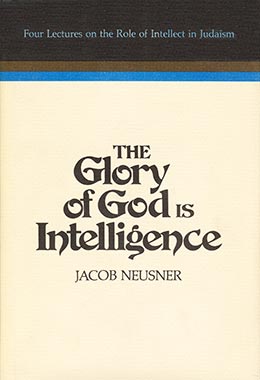Preface
Preface, in The Glory of God Is Intelligence: Four Lectures on the Role of Intellect in Judaism (Provo, UT: Religious Studies Center, Brigham Young University, 1978), 1–12.
The invitation to return to Brigham Young University and to present a series of four lectures was particularly welcome to me. For Brigham Young University provides a unique forum for scholars of religions, consisting, as it does, of faculty and students who take seriously the claims of one religion, and who also preserve the commitment to intellect and critical thought which make possible scholarship on all religions. I was glad to accept the invitation of our former student at Brown University, Professor S. Kent Brown, who teaches ancient scriptures at Brigham Young University, further to prepare lectures which might be published as a reasonably coherent statement on a topic of common interest.
For that purpose I present four lectures on a theme of importance to my Mormon hosts and to my topic of specialization, Judaism. Intellectuals of The Church of Jesus Christ of Latter-day Saints, my hosts, face the question of how through the use of their minds in essentially academic and intellectual pursuits they may understand themselves to be servants of God. The thought of Judaism on the centrality of learning—learning in Torah, revelation—in the service of God—seems to me a particularly relevant and appropriate topic. As indicated, it also permits me to draw together some diverse, and now completed, researches of mine, so that I may see how the results of various projects relate to a single problem. For this purpose I draw heavily upon available writings, reorganizing and extensively revising them for the present purpose, which is, in sequence, theological, historical, and literary in focus.
The theme of these lectures, then, is the distinctive conception of Judaism that we serve God through the use of our minds. The mythic expression of that conception, contained in the words Talmud Torah, study of divine revelation, of course makes the idea rather particular to Judaism. My effort here is to spell out the theological, historical, and literary traits of the ideal of Talmud Torah as the very center and heart of Judaism. I address myself, therefore, not to the generalized philosophical notion that intellect and worship go hand in hand. Rather, I turn to the concrete and specific one that Talmud Torah outweighs all other religious and moral obligations, that the central symbol of Judaism is the scroll of the Torah, that the heart of the liturgy of Judaism is the hearing of the Torah read in the synagogue, and that the principal religious action called for by Judaism is to learn Torah.
I propose to explain three things, first, the theological meaning of Talmud Torah, second, the point in the history of Judaism that Talmud Torah enters the center of Judaic life, and, third, the particular document which, in addition to the Pentateuch, the written Torah received by Moses at Mount Sinai, is deemed by Judaism to constitute Torah, requiring study, interpretation, and concrete exegesis in every aspect of the good life. In so doing, I propose to draw together a number of lines of reflection and research into what I hope is a coherent account of what I conceive to form the heart and soul of Judaism.
I appreciate my hosts’ invitation to make these lectures available for publication. While speaking from a written manuscript, rather than an outline, requires considerably greater preparation, the possibility of sharing these papers with a wider audience provides ample compensation. I have tried to produce lectures worthy of both the excellence of their audiences in Provo and the interest and attention of those elsewhere who may read them.
Documentation for these lectures will be found as follows: Lecture One, Invitation to the Talmud; Lecture Two, The Rabbinic Traditions about the Pharisees before 70; Lecture Three, Eliezer ben Hyrcanus: The Tradition and the Man and A Life of Yohanan ben Zakkai, and Development of a Legend: Studies on the Traditions Concerning Yohanan ben Zakkai; Lecture Four, A History of the Mishnaic Law of Purities. XXI, The Redaction and Formulation of the Order of Purities in Mishnah and Tosefta and XXII, The Mishnaic System of Uncleanness: Its Context and History.
